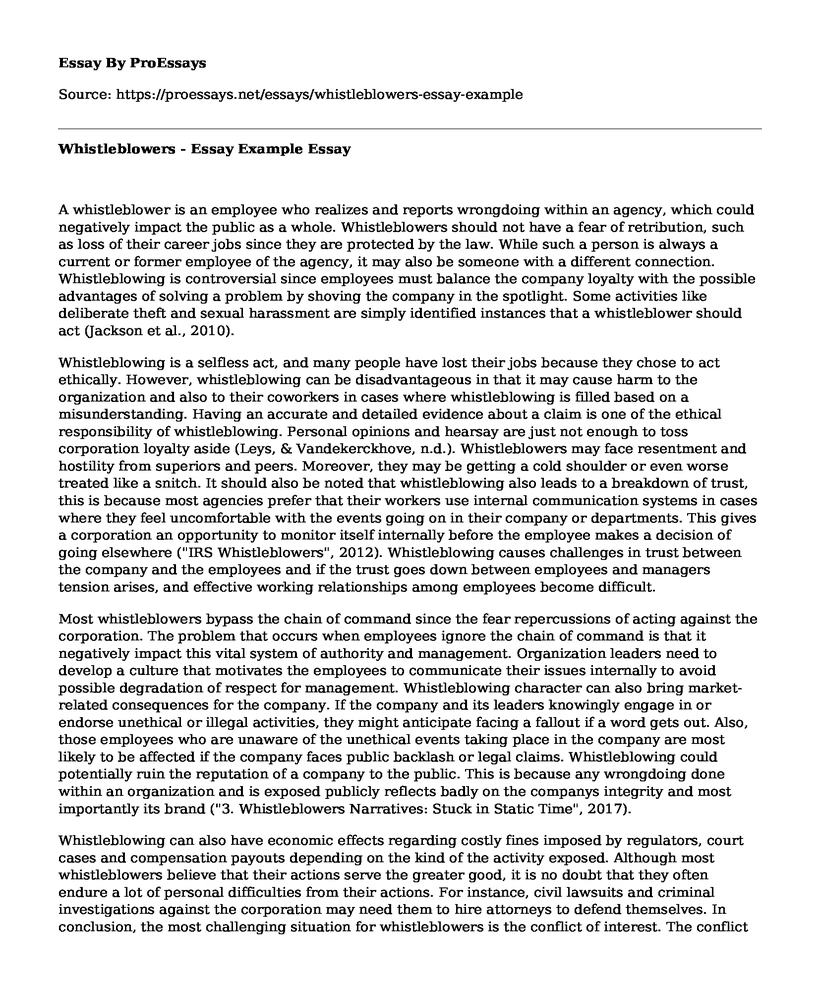A whistleblower is an employee who realizes and reports wrongdoing within an agency, which could negatively impact the public as a whole. Whistleblowers should not have a fear of retribution, such as loss of their career jobs since they are protected by the law. While such a person is always a current or former employee of the agency, it may also be someone with a different connection. Whistleblowing is controversial since employees must balance the company loyalty with the possible advantages of solving a problem by shoving the company in the spotlight. Some activities like deliberate theft and sexual harassment are simply identified instances that a whistleblower should act (Jackson et al., 2010).
Whistleblowing is a selfless act, and many people have lost their jobs because they chose to act ethically. However, whistleblowing can be disadvantageous in that it may cause harm to the organization and also to their coworkers in cases where whistleblowing is filled based on a misunderstanding. Having an accurate and detailed evidence about a claim is one of the ethical responsibility of whistleblowing. Personal opinions and hearsay are just not enough to toss corporation loyalty aside (Leys, & Vandekerckhove, n.d.). Whistleblowers may face resentment and hostility from superiors and peers. Moreover, they may be getting a cold shoulder or even worse treated like a snitch. It should also be noted that whistleblowing also leads to a breakdown of trust, this is because most agencies prefer that their workers use internal communication systems in cases where they feel uncomfortable with the events going on in their company or departments. This gives a corporation an opportunity to monitor itself internally before the employee makes a decision of going elsewhere ("IRS Whistleblowers", 2012). Whistleblowing causes challenges in trust between the company and the employees and if the trust goes down between employees and managers tension arises, and effective working relationships among employees become difficult.
Most whistleblowers bypass the chain of command since the fear repercussions of acting against the corporation. The problem that occurs when employees ignore the chain of command is that it negatively impact this vital system of authority and management. Organization leaders need to develop a culture that motivates the employees to communicate their issues internally to avoid possible degradation of respect for management. Whistleblowing character can also bring market-related consequences for the company. If the company and its leaders knowingly engage in or endorse unethical or illegal activities, they might anticipate facing a fallout if a word gets out. Also, those employees who are unaware of the unethical events taking place in the company are most likely to be affected if the company faces public backlash or legal claims. Whistleblowing could potentially ruin the reputation of a company to the public. This is because any wrongdoing done within an organization and is exposed publicly reflects badly on the companys integrity and most importantly its brand ("3. Whistleblowers Narratives: Stuck in Static Time", 2017).
Whistleblowing can also have economic effects regarding costly fines imposed by regulators, court cases and compensation payouts depending on the kind of the activity exposed. Although most whistleblowers believe that their actions serve the greater good, it is no doubt that they often endure a lot of personal difficulties from their actions. For instance, civil lawsuits and criminal investigations against the corporation may need them to hire attorneys to defend themselves. In conclusion, the most challenging situation for whistleblowers is the conflict of interest. The conflict of interest arises when a whistleblower has to decide between protecting the public and serving the company.
References
3. Whistleblowers Narratives: Stuck in Static Time. (2017). Whistleblowers. doi:10.7591/9781501712937-004
IRS Whistleblowers. (2012). Whistleblowers, 153-168. doi:10.1002/9781118386545.ch9
Jackson, D., Peters, K., Andrew, S., Edenborough, M., Halcomb, E., Luck, L., . . . Wilkes, L. (2010). Understanding whistleblowing: qualitative insights from nurse whistleblowers. Journal of Advanced Nursing, 66(10), 2194-2201. doi:10.1111/j.1365-2648.2010.05365.x
Leys, J., & Vandekerckhove, W. (n.d.). Whistleblowing duties. International Handbook on Whistleblowing Research, 115-132. doi:10.4337/9781781006795.00012
Cite this page
Whistleblowers - Essay Example. (2021, Jun 17). Retrieved from https://proessays.net/essays/whistleblowers-essay-example
If you are the original author of this essay and no longer wish to have it published on the ProEssays website, please click below to request its removal:
- Operational Management of the McDonald's Company
- Self-Reflection and Evaluation: "Bring the Concept to Life" Project
- Key Issues, Problems and Opportunities of Jimmy Badger Case of Leadership
- Organizational Development OD Paper Example
- Becoming a Leader: Translation of Evidence to Practice Paper Example
- Research Paper on Equality-Based Ethical Decision Making in Nursing Organizations
- Traits of Frederick Douglass' Leadership Essay







